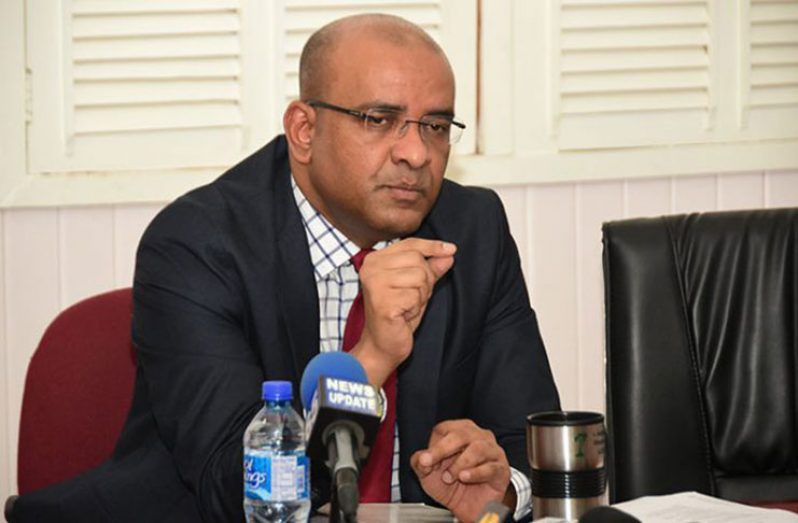OPPOSITION Leader Bharrat Jagdeo is likely to appeal in part, the decision of Chief Justice (ag) Roxanne George on the interpretation of Article 161 (2) of the Constitution of Guyana relative to the selection of a Chairman for the Guyana Elections Commission (GECOM).
The opposition leader was a named party to the case brought by city businessman Marcel Gaskin, who has also indicated that he instructed his lawyers to file a Notice of Appeal on Justice George’s decision.
Gaskin in his application had questioned whether the list of persons for appointment as GECOM Chair to be submitted by Jagdeo must include a judge, former judge or person qualified to be a judge; the President is required under the constitution to state reasons for deeming each of the six names on the list as unacceptable; the President is obliged to select a person from the six names on the list unless he has determined positively that the persons are unacceptable as fit and proper for appointment and whether a finding of act by the president that one or more persons on the list is not fit and proper renders the entire list as unacceptable.
Justice George ruled that persons nominated to be selected as Chairman of the Guyana Elections Commission (GECOM) do not have to be judges, former judges or persons qualified to serve as a judge. She also ruled that while the President has the ultimate say on who is determined fit and proper to serve in the post, and could also reject the list of nominees, he should provide reasons as to why specific persons are unsuitable.
“However, I am informed that in the course of her ruling, the Honourable Chief Justice is interpreted to have said that if the President deems every name on a list as unacceptable, then the proviso to Article 161 applies. If this report is correct, we respectfully take issue with this aspect of the Chief Justice’s ruling. We maintain most resolutely that the proviso only applies when no list has been submitted. That once a list has been submitted, the proviso has no applicability,” Jagdeo said in a statement on Tuesday.
The Opposition leader has submitted two lists to President Granger, both of which were outrightly rejected by the head-of-state. When the decision was handed down, the opposition leader was in the process narrowing down his nominees for the post with the intent of submitting a third list to the President.
“It is public knowledge that a list has been submitted several months ago. The first six names on that list have been rejected and a second six set of names have been substituted therefor. The second set of names has also been rejected and a third set of names shall be submitted shortly — all upon the invitation of the President,” Jagdeo stated.
He said the proviso to Article 162 of the Constitution had not been placed before the court for its interpretation, nor was it part of any of the questions posed to the court, nor was it the subject of any legal submissions, neither from the Applicant’s, or the Guyana Bar Association nor his Attorneys-at-Law.
“It is therefore rather strange that such a proposition appears to form part of the ruling in the case. I await a copy of the written decision and if that statement is in fact in the written decision, then I will have no alternative but to support any appeal filed by Marcel Gaskin in the matter.”
That aside, Jagdeo said based on media reports he was satisfied with clarification provided on many of the issues answered by the Chief Justice. Meanwhile, the government has argued that the Chief Justice vindicated its position that it is the President who must determine whether the list of nominees submitted by the opposition leader is acceptable. The Chief Justice also confirmed in her ruling that it is the President, acting in his own deliberate judgment, who must determine whether a person is ‘fit and proper.’
Justice George-Wiltshire, in her ruling, advised that there is no legal requirement for the President to state reasons for rejecting a list, though it is her belief that in the furtherance of democracy and good governance, he should, since Article 161 (2) speaks to the need for dialogue and compromise.
In a statement, government said the President has made consultation and dialogue priorities by meeting with the opposition leader and other members of the Opposition as recent as June 12, 2017. They had previously met on March 8, 2017.
“After the first list had been rejected on Constitutional grounds, the Head of State and Mr. Jagdeo engaged in a period of consultations, with legal representatives from the People’s Progressive Party (PPP) meeting with the Attorney General and Minister of Legal Affairs Mr. Basil Williams, to ensure that there was a clear understanding of the requirements as stated in the Constitution,” the statement noted.




.jpg)










